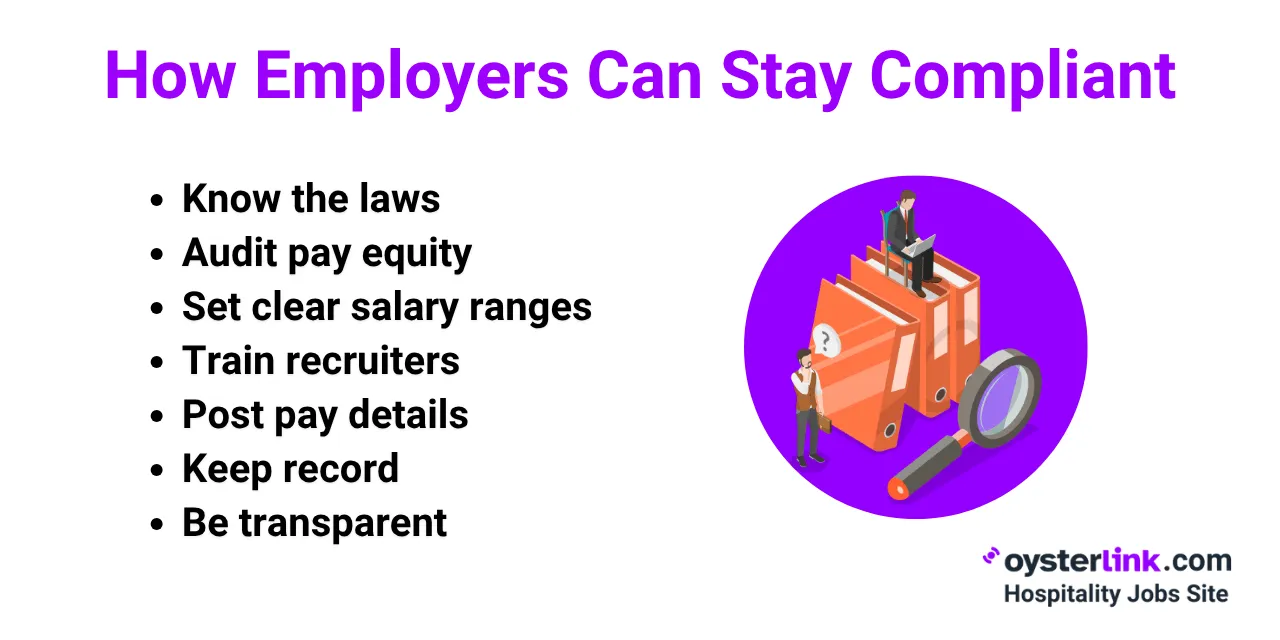More states are adopting salary range laws, requiring employers to disclose pay in job postings. This guide breaks down where it's mandatory, what's changing in 2025 and how to stay compliant with evolving pay transparency rules.
What Is a Salary Range Law?
Salary range laws require employers to share salary information with job applicants — and in some cases, current employees — to promote equity and reduce wage gaps.

These regulations vary by state but generally cover salary ranges, total compensation and remote work. Employers may also need to disclose pay in job posts or during hiring, along with details on benefits, bonuses and other forms of compensation.
How Does a Salary Range Law Relate to Pay Transparency?
Salary range laws are a key part of broader pay transparency efforts.
By mandating that employers disclose pay information, these laws help ensure fairness, close wage gaps and create a more open conversation about compensation in the workplace.
States with a Salary Range Law for Job Postings
Here’s a breakdown of the states with statewide pay transparency laws:
As of November 2025.*
1. California

California's pay transparency law, effective since January 1, 2023, applies to employers with 15 or more employees. These businesses must include salary ranges in all job postings, including those for remote positions that could be performed in California.
The law also prohibits employers from asking about an applicant's salary history and requires them to provide current employees with the salary range for their position upon request.
Employers must maintain records of job titles and wage rate histories for each employee for the duration of their employment plus three years after termination.
Violations can result in civil penalties ranging from $100 to $10,000 per instance. The law aims to promote pay equity and empower workers with more information about potential compensation.
2. Colorado

Colorado's Equal Pay for Equal Work Act (EPEWA), which took effect on January 1, 2021, requires employers with at least one employee in the state to disclose compensation and benefits information in job postings.
This includes salary or hourly wage ranges and a general description of other compensation, such as bonuses, commissions or tips. The law applies to all job opportunities, including promotions and transfers.
Recent updates to the law, effective January 1, 2024, expanded its scope. Employers must now post, advertise and notify all employees of all job opportunities, not just promotional ones.
They must also provide post-selection notifications about newly hired or promoted employees to other workers. Violations can result in fines ranging from $500 to $10,000 per occurrence.
3. Connecticut

Connecticut's pay transparency law, effective since October 1, 2021, applies to all employers with at least one employee in the state. Employers must disclose the salary range for a position to applicants at the earliest of these events: upon the applicant's request, before or when an offer is made or when the applicant is hired.
For current employees, the salary range must be disclosed upon hiring, when the employee's position changes or at the employee's request.
The law also prohibits employers from inquiring about an applicant's salary history, either directly or through a third party. However, if an applicant voluntarily discloses their salary history, the employer may verify that information. Violations can lead to compensatory damages, attorney's fees and potential punitive damages through civil action.
4. Hawaii

Hawaii's pay transparency law, which went into effect on January 1, 2024, applies to employers with 50 or more employees. These employers must include the hourly rate or salary range in job postings and advertisements.
The law does not require disclosures for internal transfers or promotions, nor does it apply to public employee positions where compensation is determined by collective bargaining agreements.
While the law does not specify penalties for violations, the Hawaii Civil Rights Commission is authorized to accept complaints alleging violations. Employers may face potential lawsuits for non-compliance, although the exact consequences are not explicitly outlined in the legislation.
5. Maryland

Maryland's pay transparency law, effective October 1, 2024, applies prospectively to all job postings made on or after this date. It mandates that employers of all sizes include wage ranges (the minimum and maximum salary or hourly rate) and a general description of benefits and other compensation elements in both external and internal job postings.
This includes postings on social media, in newspapers, via emails and through other mediums. The law also applies to positions where work is performed in Maryland, even if only partially.
Employers must disclose the required information before discussing compensation with an applicant and upon request at any stage. Additionally, employers must keep records of compliance for at least three years from the position's posting or the date it was filled.
For non-compliance, penalties include a compliance order for the first violation, fines of up to $300 per employee or applicant for a second violation, and up to $600 for subsequent violations within three years. The Maryland Department of Labor enforces the law, and complaints can be filed by employees or applicants if they believe their rights under the law have been violated.
6. Nevada

Nevada’s pay transparency law (SB293), effective October 1, 2021, applies to employers regardless of size or industry. Employers are prohibited from seeking or using an applicant's wage or salary history, even if the information is disclosed voluntarily. However, employers may ask about salary expectations for the position.
Employers must disclose the wage rate or salary range for positions under specific circumstances:
- For applicants: Employers must automatically provide the wage rate or salary range after an interview.
- For current employees: Employers must provide the wage rate or salary range if the employee applies for a promotion or transfer, completes an interview or receives an offer and requests the information.
Violations of the law are enforced by the Nevada Labor Commissioner, with penalties of up to $5,000 for non-compliance.
7. Rhode Island

Rhode Island's Pay Equity Act (effective January 1, 2023) requires employers to disclose wage ranges under specific circumstances. Employers must provide the wage range:
- Automatically at the time of hire or internal transfer to a new position
- Upon request by current employees for their position
Employers cannot ask job applicants about their wage history or rely on it when setting pay. However, if an applicant voluntarily discloses their wage history, employers may use it to justify offering a higher wage than initially proposed.
The law also prohibits employers from restricting employees from discussing wages with others. Alleged violations can lead to penalties enforced by the Rhode Island Department of Labor and Training or civil action brought by employees.
8. Washington

Washington’s pay transparency law, effective January 1, 2023, applies to employers with 15 or more employees. Employers must include the wage scale or salary range and a general description of benefits and compensation in all job postings, including those conducted electronically or via third parties.
For current employees offered an internal transfer or promotion, employers must disclose the wage scale or salary range for the new position upon request.
9. New York

New York's pay transparency law, effective September 17, 2023, mandates that employers with four or more employees statewide include a salary range in all job postings. Employers must list a minimum and maximum annual salary or hourly wage range, along with a note if the position is commission-based. This applies to job opportunities, promotions and transfers across the state.
Employers are prohibited from retaliating against employees or applicants who request this information. The law aims to promote transparency and address wage disparities across New York State. Enforcement mechanisms were not explicitly detailed in the provided information and should be confirmed for accuracy.
10. The District of Columbia
Effective June 30, 2024, D.C. employers, regardless of size, must include the minimum and maximum salary or hourly pay in all job postings and position descriptions.
Additionally, they are required to disclose salary ranges to applicants upon request and provide details about healthcare benefits an employee may receive before the first interview.
Employers are prohibited from seeking wage history from prospective employees, including from former employers, and must post a notice in a conspicuous location informing employees of their rights under the Wage Transparency Omnibus Amendment Act of 2023.
11. Minnesota

Minnesota's pay transparency law, signed in May 2024, will take effect on January 1, 2025. It applies to employers with 30 or more employees in Minnesota. Under this law, job postings must include a "starting salary range" or a "fixed pay rate" if no range is planned.
The law prohibits open-ended salary ranges and requires all compensation amounts to be good faith estimates for the position. Employers must also provide a general description of benefits and other compensation, including health and retirement benefits.
The law extends to third-party recruiters, who must include the required pay transparency disclosures in job postings. While the law does not specify penalties for non-compliance, enforcement will be overseen by the Minnesota Department of Labor and Industry and the Minnesota Attorney General. Employers could be subject to civil penalties and damages under existing Minnesota statutes.
12. Illinois

Illinois is set to join the ranks of states with pay transparency laws on January 1, 2025. The new law will require employers with 15 or more employees to include pay scale and benefits information in job postings. This requirement applies to positions that will be performed at least partially in Illinois or to roles where the employee will report to a supervisor, office or work site in the state.
Employers must provide a good faith salary range that they reasonably expect to pay for the position. They must also include a general description of benefits and other compensation programs. The law mandates that employers maintain records of job postings, pay ranges, benefits and wages for each position for at least five years.
13. Massachusetts

Massachusetts is poised to implement its pay transparency law on July 31, 2025. The law will require employers with 25 or more employees to disclose salary range information on job postings, including for promotions and transfers. Additionally, private employers with at least 100 employees will need to submit certain pay-related data to the state annually.
The law prohibits retaliation against applicants or employees who seek to enforce their rights under the legislation. Enforcement will be handled by the state attorney general's office, with penalties ranging from warnings for first offenses to fines of up to $25,000 for subsequent violations.
14. New Jersey

On June 1, 2025, New Jersey will require employers with 10 or more employees to include wage or salary ranges in internal and external job postings. This law applies to employers conducting business or accepting job applications in New Jersey.
The salary range must be posted along with a description of benefits and compensation programs for the role. Employers are not prohibited from offering higher wages or benefits at the time of hiring. Violators may face fines, including $300 for the first violation and $600 for subsequent violations.
15. Vermont

Vermont's law is set to take effect on July 1, 2025. Employers with five or more employees who post job openings in Vermont must disclose the salary range or compensation for the position. This applies to both internal and external job ads and includes jobs that will be performed remotely but are predominantly for an office in Vermont.
The salary range disclosed must be for the expected compensation at the time of posting. This law also mandates that job postings for tipped positions specify the base wage range.
Trends in State-Level Implementation and Enforcement of Salary Range Laws
Across the U.S., more states are enacting laws that require employers to disclose salary ranges and other compensation details in job postings, internal postings or upon employee request.
Key trends include:
- Broader scope for remote and internal roles: Some laws cover remote positions and internal transfers or promotions.
- Different enforcement and penalties: Enforcement and penalties vary by state. Some states allow employees to file complaints directly, while others rely on state labor departments. Massachusetts, for example, imposes escalating fines for violations.
- Higher compliance obligations: Employers may need to update job posting templates, retain records (such as Illinois’ five-year retention rule), and ensure third-party recruiters follow requirements.
- Early data on impact: While salary range laws aim to reduce wage gaps, research is still developing. Early evidence from Colorado shows shifts in job posting practices and workforce participation.
In short, salary range laws continue to evolve quickly. Employers operating in multiple states need to stay informed and proactive to remain compliant.
Best Practices for Employers Under Salary Range Laws
To comply with growing pay transparency requirements, employers should:

- Stay on top of state-specific salary range and pay transparency laws, since they vary and change frequently.
- Conduct regular compensation audits to identify and address inequities across gender, race or other factors.
- Establish clear, structured salary ranges for each role — based on experience, skills and performance — and document them.
- Train hiring managers and recruiters on salary disclosure requirements, remote roles and internal promotions.
- Update all job postings to include required salary range disclosures and other compensation details.
- Keep records of compensation decisions to demonstrate compliance and fairness.
- Consider proactively sharing salary ranges even in states without mandates to strengthen employer branding and attract talent.
Salary Range Law by State: Conclusion
Salary range disclosure laws are transforming how employers communicate pay. By the end of 2025, at least 15 states and jurisdictions will require salary ranges in job postings.
For employers, this shift goes beyond updating job ads — it’s about rethinking compensation strategies, embracing transparency and building trust with employees. Done well, compliance can become a competitive advantage that promotes fairness and attracts top talent.









Loading comments...